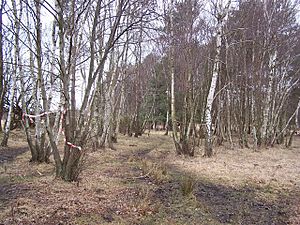Emer Bog and Baddesley Common facts for kids
| Site of Special Scientific Interest | |
 |
|
| Area of Search | Hampshire |
|---|---|
| Interest | Biological |
| Area | 39.0 hectares (96 acres) |
| Notification | 1982 |
| Location map | Magic Map |
Welcome to Emer Bog and Baddesley Common! This amazing place is a nature reserve in Hampshire, England. It covers about 50 hectares (that's like 123 football fields!). It's a special spot where nature is protected and can thrive.
This reserve is managed by the Hampshire and Isle of Wight Wildlife Trust. They work hard to look after the land and all the plants and animals that live there.
Contents
What Makes This Place Special?
Emer Bog and Baddesley Common are very important for nature. Parts of this area have special protections:
- About 39 hectares are called a Site of Special Scientific Interest (SSSI). This means the area has important wildlife or geology.
- About 37.6 hectares are called a Special Area of Conservation (SAC). This is an even higher level of protection for habitats and species that are rare or threatened in Europe.
These protections help make sure the unique environment here stays safe for future generations.
Habitats You Can Find Here
This nature reserve has a mix of different natural areas, each with its own special features:
- Valley Bog: A bog is a type of wetland. Here, it's a "valley bog," meaning it's found in a valley. This part of the reserve is not grazed by animals, which helps many delicate plants grow.
- Damp Grassland: Areas where the grass stays wet, creating a home for plants that love moisture.
- Heath: A type of open land with low-growing shrubs like heather.
- Woods: Areas with trees, providing shelter and food for many creatures.
There's also a section of acidic grassland. This type of soil is good for a different set of plants.
Amazing Plants and Animals
Emer Bog and Baddesley Common are home to a wide variety of living things. The bog areas are especially rich in wildlife.
Plants of the Bog
You can find many interesting plants here, including:
- Reed (also known as Phragmites australis): A tall, grass-like plant that grows in wetlands.
- Marsh Cinquefoil: A pretty plant with reddish-purple flowers that loves wet, boggy ground.
- Bog Bean: Another wetland plant with white or pink flowers, often found floating on water.
Insects and More
The rich plant life supports many different animals. The reserve is especially known for its many types of moths. These insects play an important role in the ecosystem, helping to pollinate plants.

